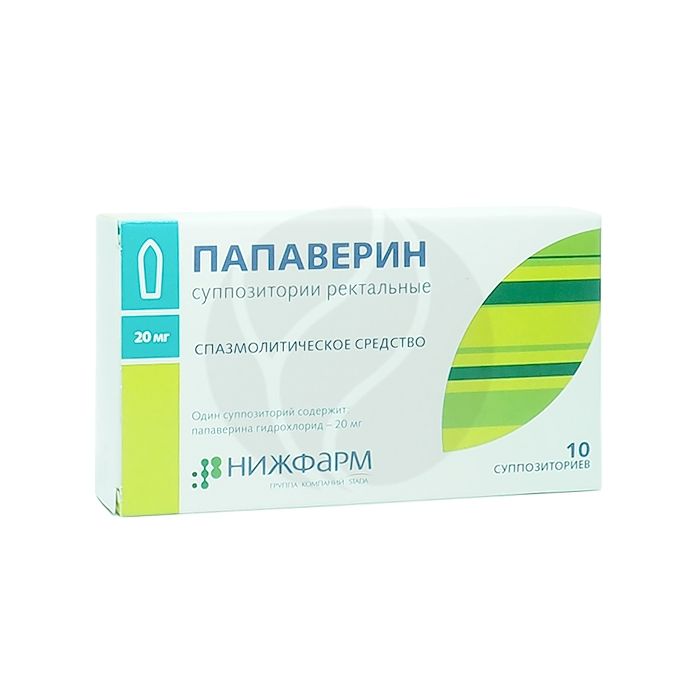Papaverine hydrochloride suppositories 20mg, No. 10
Expiration Date: 05/2027
Russian Pharmacy name:
Папаверина гидрохлорид суппозитории 20мг, №10
Spasm of smooth muscles: abdominal organs (with cholecystitis, pylorospasm, spastic colitis);
with renal colic;
peripheral vessels (with endarteritis);
cerebral vessels (with migraine);
heart (with angina pectoris - as part of complex therapy);
bronchi (with bronchospasm).
Rectally - 20-40 mg 2-3 times / day.
Composition for one suppository:
active substance: papaverine hydrochloride - 20 mg;
excipients: solid fat (Witepsol (grades H 15, W 35), Supposir (grades NA 15, NAS 50)) - until a suppository weighing 1.25 g is obtained.
AV blockade,
glaucoma,
severe liver failure
old age (risk of developing hyperthermia),
childhood,
hypersensitivity to papaverine.
pharmachologic effect
Myotropic antispasmodic. Inhibits PDE, causes the accumulation of cAMP in the cell and reduces the content of intracellular calcium. Reduces the tone of smooth muscles of internal organs (gastrointestinal tract, respiratory, urinary, reproductive system) and blood vessels. It causes the expansion of the arteries, increases blood flow, incl. cerebral. Has a hypotensive effect.
In high doses, it reduces the excitability of the heart muscle and slows down intracardiac conduction.
When used in moderate therapeutic doses, the effect on the central nervous system is weak.
Pharmacokinetics
Bioavailability is 54%. Plasma protein binding - 90%. It is well distributed in the body, penetrates the histohematogenous barriers. It is metabolized in the liver.
T1 / 2 - 0.5-2 hours. Increase up to 24 hours is possible.
It is excreted by the kidneys in the form of metabolites. It is completely removed from the blood during dialysis.
Side effect
Possibly: nausea, constipation, drowsiness, excessive sweating, arterial hypotension, increased activity of hepatic transaminases.
With a rapid on / in the introduction, as well as when used in high doses: the development of AV blockade, cardiac arrhythmias.
Contraindications for use
AV blockade, glaucoma, severe liver failure, old age (risk of hyperthermia), children under 6 months of age, hypersensitivity to papaverine.
Application during pregnancy and lactation
During pregnancy and lactation (breastfeeding), the safety and efficacy of papaverine has not been established.
Application for violations of liver function
Contraindicated in severe hepatic impairment.
Application in children
Contraindicated in children under 6 months of age.
Use in elderly patients
Contraindicated in old age (risk of developing hyperthermia).
special instructions
Use with caution in conditions after traumatic brain injury, chronic renal failure, adrenal insufficiency, hypothyroidism, prostatic hyperplasia, supraventricular tachycardia, shock conditions.
IV should be administered slowly and under medical supervision.
During the period of treatment, alcohol consumption should be excluded.
Drug interactions
With simultaneous use with anticholinergics, anticholinergic effects may be enhanced.
It is believed that when used simultaneously with alprostadil for intracavernous administration, there is a risk of developing priapism.
There are reports of a decrease in the effectiveness of levodopa with its simultaneous use.
Reduces the hypotensive effect of methyldopa.

